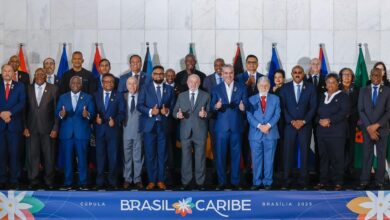— Hub to help small states access millions for climate change
By Neil Marks in Malta
COMMONWEALTH Heads of Government have mandated the bloc’s London office to develop a plan to ensure the sustainability of the Iwokrama International Centre for Rainforest Conservation.
“What the heads told us to do is help in the creation of a sustainable financial business plan for Iwokrama and we are happy to work in that direction,” outgoing Commonwealth Secretary-General Mr Kamalesh Sharma told Guyanese media Saturday evening.

The Commonwealth once funded the Iwokrama project, but the body no longer provides budgetary support to projects anymore, Mr Sharma said.
The announcement from Sharma came as Commonwealth leaders agreed to a new arrangement to help small states access funding for climate change. The Iwokrama Centre has had to be bailed out by government twice this year; it received two separate grants of US$100, 000.
A high-level team has since been appointed to determine the way forward for the centre.
President David Granger came to the Commonwealth Heads of Government meeting in Malta to lobby the Commonwealth to recommit its support to Iwokrama.
The 371, 000- hectare Iwokrama forest was offered as a gift to the Commonwealth in 1989 by then President Desmond Hoyte.
In 1996, the Iwokrama International Centre (IIC) was set up to manage the rainforest, “In a manner that will lead to lasting ecological, economic and social benefits to the people of Guyana and to the world in general.”
Guyana is committed to Iwokrama and the viability of Iwokrama is tied up with the whole issue of global warming and climate change.
Apart from 16 local communities, Iwokrama brings together scientists engaged in ground-breaking research into the impact of climate change on the forest and measuring the scope and value of its ecosystem services.
See also: An Interview With Guyanese President David Granger
Harvesting
Recently, the Iwokrama Centre announced that it has begun harvesting trees in the second phase of a project designed to bring in revenue and at the same time demonstrate sustainable use of the forest.
The centre will employ a 60-year cutting cycle, harvesting a maximum of 1,800 hectares per year (which is less than 0.5 per cent of the Iwokrama Forest) under a very selective harvesting regime, which will result in only a few stems per hectare being removed and no large gaps being created in the forest canopy.
The setting up of a hub to help small states have greater access to funds to tackle climate change could be what Guyana needs.
The initiative comes just ahead of the opening of the UN Climate Summit in Paris. The Commonwealth Finance Access Hub will help countries successfully bid for climate-action funding.
“The flow of international climate funds for Small Island Developing States and Least Developed States, which are the most vulnerable to climate change, has remained problematic. The hub will assist in unlocking existing and new climate funds for urgent adaptation and mitigation,” said Prime Minister of Mauritius Sir Anerood Jugnauth.
Mauritius has agreed to host the hub, which will be linked to technical advisers across the Commonwealth. Australia has pledged US$1 million to the Climate Finance Access Hub.
Ambitious agreement
The Commonwealth Heads of Government have called for an ambitious, equitable, inclusive climate-change agreement in Paris that will limit the rise in global temperatures to below 2 or 1.5 degrees.
“We are deeply concerned about the threat posed by climate change, which continues to grow and to put at risk the economic, social, environmental, and cultural well-being of our member states and citizens. Many of our most vulnerable states and communities are already facing the adverse impacts of climate change, which can roll back decades of development gains,” their statement said.
On Friday, developed Commonwealth countries reaffirmed their commitment to play their part in mobilising the US$100 billion every year by 2020 to address the adaptation and mitigation needs of developing countries.
During the special CHOGM session on climate change, Canada pledged $2.65 billion over five years to help developing countries cope with the issue and the UK £21 million for disaster management and £5.5 million for the ocean-based economy.
“Forty-seven of the 53 Commonwealth nations have already declared their Intended Nationally Determined Contributions, in other words, the concrete actions they will take to address climate change. We are very proud of this achievement and the fact that diverse nations with different perspectives were able to come together and speak with one voice on this issue which is so critical to our survival,” the Commonwealth Secretary-General said.






